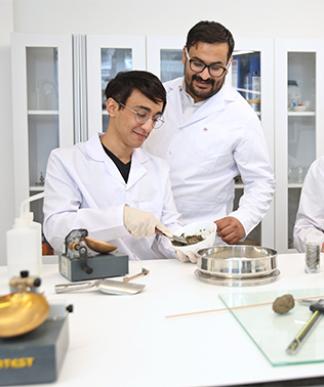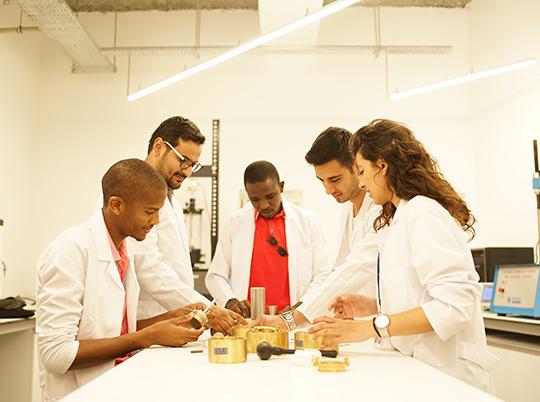


About the Program
The Energy Systems Engineering program offers students, who wish to have an academic, research, industry or entrepreneurship based career, the opportunity to pursue the doctorate degree in energy systems engineering. It is important that the Ph.D. program graduates perceive the need for lifelong learning, are constantly improving themselves and are specialized engineers who have gained detailed knowledge of the related practices. For this reason, the primary aim of the Ph.D. in Energy Systems Engineering program is to train academics who can; conduct independent research on energy systems, comment on scientific events with a broad and deep perspective, continuously improve/train themselves to adapt to innovations in the field, and identify the steps needed to reveal new syntheses. Doctoral thesis will fulfill the aims of scientific innovation developing a new scientific method and/or applying a known method to a new field.
Education Opportunities
Ph.D. program consists of seven courses, a seminar, a doctoral qualification examination, and thesis work. Four of these courses must be program-specific Ph.D. courses, while the remaining three courses may be M.Sc. or Ph.D. level courses suitable for the area of specialization in which students aim at. In the last semester of course work, each student will give a seminar about the chosen thesis topic. Students who complete the course load, including the seminar, within the period determined by the Institute of Graduate Studies and Research and have a CGPA of at least 3.00, are entitled to enter the qualification examination. Students who are successful in the qualification examination can register for the thesis and continue their research. In order to be able to defend the thesis, students should have at least one journal article related to their thesis topic published in SCI or SCI-Expanded journals. After publishing the article, students can defend their thesis at a time deemed appropriate by the thesis supervisor.

Career Areas
Graduates of the Ph.D. in Energy Systems Engineering program can work as researchers at universities or other research institutions. They can also continue their careers as academics; they can teach, in their field of specialization, at universities in North Cyprus or abroad. Graduates of Energy Systems Engineering doctorate program can follow current energy legislations, design and develop new ones, assess energy sources and supply-demand balance. They can also work on developing conversion technologies (chemical, heat, electricity, mechanics) for utilizing energy sources (oil, natural gas, coal, solar, wind, water, geothermal, biomass, wave, etc.), designing/managing energy transmission, distribution and storage processes, increasing the efficiency of energy generating systems or reducing their costs and environmental impacts of systems related to energy systems engineering.
Contact
Institute of Graduate Studies and Research
Graduate Sciences and Education Center, GE106
Tel: +90 392 671 1111 Extension: 2776
Institute E-mail: ciu-institute@ciu.edu.tr
Compulsory Courses
First Semester
SEMINAR
Course code
ENRE690Credit
0Theoretical
3Practical
0Ects
4ELECTIVE I
Course code
ENRE6X1Credit
3Theoretical
3Practical
0Ects
8ELECTIVE II
Course code
ENRE6X2Credit
3Theoretical
3Practical
0Ects
8ELECTIVE III
Course code
ENRE6X3Credit
3Theoretical
3Practical
0Ects
8ELECTIVE IV
Course code
ENRE6X4Credit
3Theoretical
3Practical
0Ects
8ELECTIVE V
Course code
ENRE6X5Credit
3Theoretical
3Practical
0Ects
8ELECTIVE VI
Course code
ENRE6X6Credit
3Theoretical
3Practical
0Ects
8Second Semester
THESIS
Course code
ENRE600Credit
0Theoretical
0Practical
0Ects
160QUAILIFICATION EXAM FOR PHD
Course code
ENRE650Credit
0Theoretical
0Practical
0Ects
20Philosophy of Science
Course code
PHIL601Credit
3Theoretical
3Practical
0Ects
8Elective Courses
EXERGY AND EXERGY-ECONOMIC ANALYSIS OF RENEWABLE SYSTEMS
Course code
ENRE606Credit
3Theoretical
3Practical
0Ects
DESIGN AND OPTIMIZATION OF ENERGY SYSTEMS
Course code
ENRE633Credit
3Theoretical
3Practical
0Ects
TECHNO-ECONOMICAL ANALYSIS OF ENERGY APPLICATIONS
Course code
ENRE502Credit
3Theoretical
3Practical
0Ects
RENEWABLE ENERGY TRANSPORTATION SYSTEMS
Course code
ENRE613Credit
3Theoretical
3Practical
0Ects
0INTEGRATED ENERGY SYSTEMS-MODELING & OPTIMIZATION
Course code
ENRE619Credit
3Theoretical
3Practical
0Ects
ADVANCED SOLAR ENERGY UTILIZATION
Course code
ENRE607Credit
3Theoretical
3Practical
0Ects
POWER SYSTEMS PROTECTION AND CONTROL
Course code
ENRE612Credit
3Theoretical
3Practical
0Ects
RESEARCH METHODS
Course code
EMNT525Credit
3Theoretical
3Practical
0Ects
0ADVANCED ENGINEERING THERMODYNAMICS
Course code
ENRE605Credit
3Theoretical
3Practical
0Ects
ENERGY SECURITY AND GEOPOLITICS
Course code
ENRE610Credit
3Theoretical
3Practical
0Ects
HEAT AND MASS TRANSFER
Course code
ENRE302Credit
0Theoretical
0Practical
0Ects
ENERGY DECISION SUPPORT TOOLS
Course code
ENRE624Credit
3Theoretical
3Practical
0Ects
POLICIES & FUTURE R&D OF FUEL CELL TECHNOLOGY
Course code
ENRE618Credit
3Theoretical
3Practical
0Ects
NUCLEAR ENERGY POLICIES
Course code
ENRE611Credit
3Theoretical
3Practical
0Ects
PERFORMANCE ANALYSIS OF ENERGY GENERATION SYSTEMS
Course code
ENRE634Credit
3Theoretical
3Practical
0Ects
ENERGY - PAST, PRESENT & FUTURE
Course code
ENRE501Credit
3Theoretical
3Practical
0Ects
0CIRCUIT THEORY I
Course code
EEE202Credit
0Theoretical
0Practical
0Ects
ENERGY SYSTEMS II
Course code
ENRE306Credit
0Theoretical
0Practical
0Ects
ADVANCED RESEARCH METHODS FOR ENGINEERING
Course code
ENGI660Credit
3Theoretical
3Practical
0Ects
8CIRCUIT THEORY II
Course code
EEE301Credit
0Theoretical
0Practical
0Ects
6ADVANCED GAS TURBINES
Course code
ENRE514Credit
3Theoretical
3Practical
0Ects
THERMAL ENERGY STORAGE PRINCIPLES AND APPLICATIONS
Course code
ENRE604Credit
3Theoretical
3Practical
0Ects
THERMODYNAMICS
Course code
ENRE301Credit
0Theoretical
0Practical
0Ects
PROJECT SCHEDULING
Course code
EMNT503Credit
3Theoretical
3Practical
0Ects
ADVANCED TECHNIWUES FOR ENERGY SYSTEMS
Course code
ENRE601Credit
3Theoretical
3Practical
0Ects
FLUID MECHANICS
Course code
CVL331Credit
0Theoretical
0Practical
0Ects
ENGINEERING ECONOMY
Course code
INDE232Credit
0Theoretical
0Practical
0Ects
TOTAL QUALITY MANAGEMENT
Course code
EMNT502Credit
3Theoretical
3Practical
0Ects
0POWER ELECTRONICS APPLICATIONS FOR RENEWABLE ENERGY SYSTEMS
Course code
ENRE505Credit
3Theoretical
3Practical
0Ects
SOLAR POWER DESIGN
Course code
ENRE507Credit
3Theoretical
3Practical
0Ects
INTERMEDIATE HEAT AND MASS TRANSFER
Course code
ENRE522Credit
3Theoretical
3Practical
0Ects
MODERN ECONOMIC ISSUES IN ENERGY SYSTEMS
Course code
ENRE527Credit
3Theoretical
3Practical
0Ects
DESIGN OF ZERO EMISSION 100% RENEWABLE CITIES
Course code
ENRE537Credit
3Theoretical
3Practical
0Ects
SOLAR - THERMAL ENERGY AND ITS APPLICATIONS
Course code
EELE581Credit
3Theoretical
3Practical
0Ects
ENGINEERING ETHICS
Course code
EMNT560Credit
3Theoretical
3Practical
0Ects
OPTICAL COMMUNICATION NETWORK
Course code
CMPE622Credit
3Theoretical
3Practical
0Ects
ANALYTICAL DECISION MAKING
Course code
MISY602Credit
3Theoretical
3Practical
0Ects
OPERATIONS RESEARCH TECHNIQUES
Course code
EMNT517Credit
3Theoretical
3Practical
0Ects
0INTEGRATION OF RENEWABLES
Course code
ENRE512Credit
3Theoretical
3Practical
0Ects
INTERMEDIATE FLUID MECHANICS
Course code
ENRE521Credit
3Theoretical
3Practical
0Ects
POWER SYSTEM HARMONICS
Course code
EELE557Credit
3Theoretical
3Practical
0Ects
SYSTEMS ENGINEERING
Course code
CVLE601Credit
3Theoretical
3Practical
0Ects
5SMART POWER GRIDS
Course code
ENRE535Credit
3Theoretical
3Practical
0Ects
FLUID MECHANICS
Course code
MCLE382Credit
0Theoretical
0Practical
0Ects
6PRODUCTION PLANNING AND SCHEDULING
Course code
EMNT501Credit
3Theoretical
3Practical
0Ects
0ADVANCED TECHNIQUES OF ENVIRONMENTAL ENGINEERING ANALYSIS
Course code
ENVE528Credit
3Theoretical
3Practical
0Ects
ADVANCED TOPICS IN BIOTECHNOLOGY
Course code
ENVE614Credit
3Theoretical
3Practical
0Ects
STATISTICS AND DATA ANALYSIS
Course code
BIOE605Credit
3Theoretical
3Practical
0Ects
BIOSEPERATIONS
Course code
BIOE606Credit
3Theoretical
3Practical
0Ects
FUNDAMENTALS OF ENERGY SYSTEMS OPTIMIZATION
Course code
ENRE533Credit
3Theoretical
3Practical
0Ects
SPECIAL TOPICS IN ENVIRONMENTAL ENGINEERING
Course code
ENVE633Credit
3Theoretical
3Practical
0Ects
POWER GENERATING SYSTEMS
Course code
ENRE534Credit
3Theoretical
3Practical
0Ects
PHOTOVOLTAIC SYSTEMS
Course code
EELE582Credit
3Theoretical
3Practical
0Ects
0INTERMEDIATE THERMODYNAMICS
Course code
MCLE511Credit
3Theoretical
3Practical
0Ects
8Students who are interested in pursuing advanced graduate studies leading to a master’s, doctoral degree or professional doctorate degree for the Fall and Spring semesters every year. Applicants can directly apply online to our graduate programs using the application portal.
TRNC Applicants- Required documents:
- Bachelor’s and Master’s Degree Diploma
- Bachelor’s and Master’s Degree transcripts for each completed academic term/year.
- Documents to prove English proficiency for English language departments,
- Scanned copy of passport or identity card.
Click for detailed admission requirements information.
Students who are interested in pursuing advanced graduate studies leading to a master’s, doctoral degree, or professional doctorate degree for the Fall and Spring semesters every year. Applicants can directly apply online to our graduate programs using the application portal.
International Applicants- Required documents:
- A valid Bachelor’s Degree and transcripts for each completed academic term/year.
- A valid Master’s Degree and transcripts for each completed academic term/year.
- Evidence of English Language competence: TOEFL (65 IBT) or IELTS (5.5). Students without these documents will take the CIU English proficiency exam on campus following arrival.
- Scanned copy of international passport/birth certificate
- CV
- Ph.D. research proposal
- Fully completed and signed CIU Rules and Regulations document (which can be downloaded during the online application)
Click for detailed admission requirements information.
Cyprus International University provides academic scholarships for its students as an incentive for success, with most students benefiting from 50%, 75% or 100% scholarships or discounted tuition fees. Click for more information.
Tuition Fees are determined at the beginning of each academic year. Candidate students who are entitled to enroll in CIU can learn their fees in line with the Tuition Fee Calculation system.